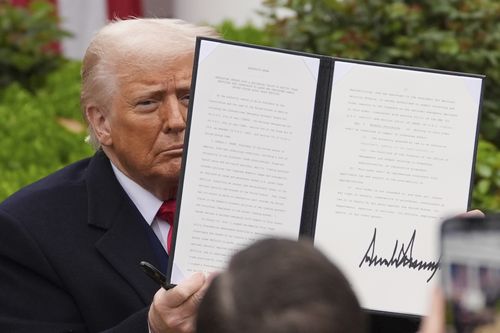Share this @internewscast.com
China has promised to retaliate after President Donald Trump announced substantial new tariffs on its exports to the United States as a significant shift in America’s long-standing global trade policy.
On Wednesday, Trump introduced 54 percent tariffs on all Chinese imports into the US, a decision expected to significantly alter relations and escalate the trade conflict between the world’s two largest economies.
“China strongly opposes this and will firmly implement measures to protect its own rights and interests,” stated China’s Ministry of Commerce in a message on Thursday morning.

“China is very embedded into global production networks ranging from finished goods to intermediate products to even the sourcing of raw materials, and so this is not going to be an easy or straightforward process,” Marro added.
Countries that Chinese and international firms have been moving to as they diversified their supply chains in recent years, such as Vietnam and Cambodia, have also been hit hard by Trump’s tariffs, further complicating such considerations.
The tariffs also come at a challenging time for China’s slowing economy, with officials in recent weeks ramping up efforts to spur weak domestic consumption as they braced for a widening trade war.
Meanwhile, extensive US grievances around China’s economic model, such as its treatment of foreign businesses, its use of state subsidies, forced intellectual property localization and technology transfers could mean more escalation may come, according to Marro. “All of these triggers could lead us to even higher tariff rates,” he said.
The US tariffs already had levies on hundreds of billions of dollars worth of Chinese imports into the country.
Many of those duties were holdovers from Trump’s first term in office, when he launched his first trade war with China that resulted in a “phase one” trading agreement that analysts say Beijing never fully implemented. The former Biden administration then ratcheted up tariffs on some additional Chinese goods, including a 100% rate on electric vehicles last year.
This time around, China will likely respond with precision, analysts say.
“Rather than broad retaliation, expect a playbook of calibrated pressure: new tariffs on politically sensitive US exports like agriculture and industrial machinery, expanded use of the ‘Unreliable Entity List’ to target high-profile US firms, and selective export controls on critical inputs,” said Craig Singleton, a senior fellow at the US-based Foundation for Defense of Democracies.

Prime minister falls off stage on election campaign trail
“If (Chinese leader Xi Jinping) refuses to engage, the pressure escalates. If he engages too soon, he risks looking weak. Neither (leader) wants to be seen as folding first, but delay could deepen the standoff,” he added.
But as Trump’s sweeping move shakes up US economic relationships with both friend and foe, Beijing may see some silver lining, analysts say.
In recent weeks, Beijing has launched a charm offensive seeking to showcase itself as a champion of global trade and a reliable partner for companies and countries from East Asia to Europe.
With the US becoming an “unpredictable partner,” East Asian economies like Japan, South Korea and Taiwan are likely to reassess their relations with the US, which could potentially benefit China, according to Jason Hsu, a senior fellow at the Hudson Institute, a US think tank, and a former legislator in Taiwan.
“Japan and Korea, the bigger economies, they are still in no position to retaliate against US, but what they could do is to quietly develop a relationship with China to re-engage, to reassess Chinese market opportunities,” he said.
















